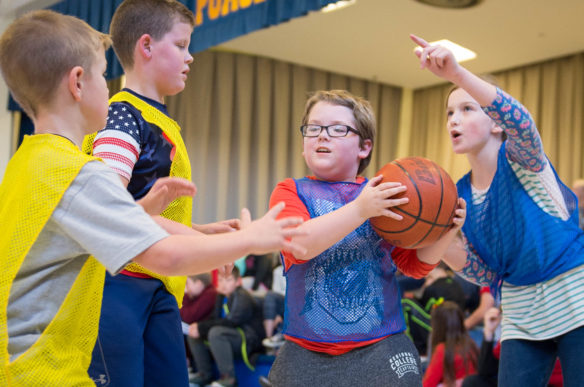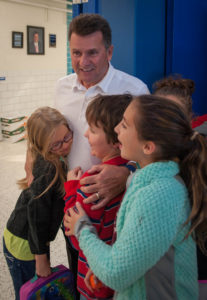
Pogue Elementary School (Ashland Independent) students Laura Beth Stanfield, right, tells Aiden Johnson to shoot the ball during a game of noonball. In the game, which was created by a former principal at the school, every player on the team gets a chance to shoot the ball.
Photo by Bobby Ellis, Nov. 29, 2016
By Mike Marsee
michael.marsee@education.ky.gov
As the girl drives toward the basket and looks to shoot, the defenders who blocked her path back away, leaving her with an open shot from close range.
That may not sound like the way basketball is supposed to be played, but it is the norm in noonball, a variation of the game that has been the most popular recess activity at Poage Elementary School for more than 20 years.
Noonball is an informal basketball league open to every student in the 4th and 5th grades at the Ashland Independent school.
“It is something that makes Poage special,” Principal Katie Holbrook said. “Everybody knows how important academics are, but the social aspects of noonball and the community that it builds, that’s what it’s about.”
Noonball is a wintertime recess activity at Poage Elementary – the season begins when students can no longer go outdoors for recess – but it’s more than that. It has become a lesson in inclusiveness and an opportunity for students who might not otherwise take part in team sports to have their time to shine.
“It’s not really about winning. It’s kids having fun at lunchtime and doing something that some of them may never have a chance to do,” said Jeremy Howell, who taught at Poage Elementary for the past five years and was coordinator of the noonball league before moving to another school this year.
Longtime Poage principal Bob Blankenship started noonball 21 years ago in his first year at the school. He had been the boys’ basketball coach at Paul G. Blazer High School, so building a recess activity around basketball was a natural for him.
Blankenship – who retired in 2012 – didn’t want to create a competitive league in which the school’s best basketball players would rise to the top.

Bob Blankenship, a retired principal at Poage Elementary School (Ashland Independent), is hugged by students as he enters the gym to watch a noonball game. Blankenship created noonball in 1995 as a recess activity that all students could take part in during the winter months.
Photo by Bobby Ellis, Nov. 29, 2016
“Mr. Blankenship was very careful to make it inclusive,” said Jeff Kennard, a 4th-grade teacher who is coordinating the league this year. “He was very careful to make sure that it wasn’t just about kids who play basketball and to make sure that they didn’t dominate. In fact, one rule that we call the Blankenship rule now is that in the third quarter, your best player sits out so the others can have some playing time.”
Howell was a 6th-grade student at Poage Elementary when noonball was introduced. Blankenship said he had to sell Howell, who was a basketball player, and others like him on the fact that noonball wasn’t created with them in mind.
“I had to convince them that for these other kids, this was their moment of glory,” Blankenship said. “When we started, we were probably one of five schools in the state that were recognized as being an inclusion school. When a child leaves this school, he has been around children in wheelchairs, children who have seizures. We did everything we could to make sure that if a child wanted to play, they played. What a lesson we’re teaching those kids, that inclusion works for them.”
Jamie Sparks of the Kentucky Department of Education’s Coordinated School Health team said inclusion is an important lesson for all students.
“Instituting appropriate practices around equitable access to recess time while also making it engaging and inclusive for all students continues to be a growing conversation around the country. Recess time is valuable time for schools to invest in that helps promote the tenets of the whole child,” Sparks said. “Examples like this are essential for Kentucky’s education leaders as we promote a well-rounded education for all students every day.”
Almost everyone plays, including special-needs students, whose every move is cheered.
“If a special-needs child gets the basketball, people move out of the way and they may give him two or three shots,” Blankenship said.
Those who choose not to play sometimes keep score or keep statistics. Results of the previous day’s game are read with the morning announcements, along with some stats that might be padded just a bit.
“Even if they didn’t have a rebound, we told them they did. Every kid wants to hear their name called,” Blankenship said.
Syracuse and Louisville – captains picked team names from a list of well-known colleges – faced off before a near-capacity crowd of classmates on opening day. Every player played a minimum amount of time and everyone was allowed to shoot.
Violations called against more skilled players are often overlooked when committed by other players, and phantom fouls might be called to keep a game from getting too one-sided.
Each team is led by faculty coaches who keep track of who needs to play and who needs to shoot, often with help from some of their players.
“The kids are great to help us. They will make sure everyone gets in. They will hand the ball to a child to make sure they shoot,” said 4th-grade teacher Silesia Damron, who has coached noonball teams at Poage for 15 years.
Fifth-grade students earn the right to become team captains based on their grades, behavior, leadership and character.
Robin Stanfield, a 5th-grade teacher who coached one of the teams that played on opening day of this season, said she has seen the positive effects of noonball follow students outside the gym.
“They hold their head up higher in the classroom. They have more confidence, that ‘You know I can do this,’” she said. “It does rub off in the classroom, just with confidence to raise their hand, confidence that, ‘It’s OK if I miss this answer.’ It makes it a safe place to learn.”
Noonball helps in other areas, too. Blankenship said attendance went up as the game grew in popularity. Both he and Holbrook said the school has seen fewer disciplinary problems because students don’t want to lose the privilege of playing.
The league runs for three months or until the weather begins to turn warmer. It concludes with a postseason tournament, and the championship is preceded by an alumni game in which high school students who attended Poage return to play one last game.
“It’s nice that they take time out of their schedule to come back, and the kids love to see them,” Holbrook said.
Blankenship said he’s surprised noonball has never taken hold at any of the other schools in the district, but it is ingrained in the culture at Poage.
“Each principal that’s come in has continued it,” Howell said.
“I was asked three times in my interviews if I was going to continue noonball. I said, ‘Of course, it’s a tradition,’” Holbrook added.
That brings a smile to Blankenship’s face.
“I hope it never dies,” he said.
MORE INFO …
Katie Holbrook katie.holbrook@ashland.kyschools.us
Jeremy Howell jeremy.howell@ashland.kyschools.us
Jeff Kennard jeff.kennard@ashland.kyschools.us








Leave A Comment